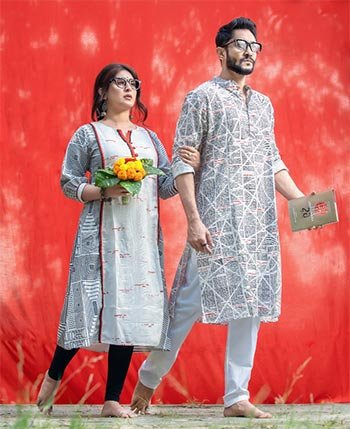
Ekushey February, also known as International Mother Language Day, is a significant cultural and historical event in Bangladesh. On this day, Bangladeshis commemorate the Language Movement of 1952 when they protested for the recognition of Bengali as one of the official languages of Pakistan.
On Ekushey February, people in Bangladesh often wear traditional dresses to celebrate their cultural heritage and pay homage to the language martyrs.
Amar Ekushey is right around the corner, and the entire nation is preparing to observe this day that holds historical significance as a turning point in the birth of Bangladesh.
The symbol of the day is black and white. Its not that someone imposed this dress code, rather it came spontaneously. The dress code indeed symbolizes grief and mourning. During 21st February every year, the countrys streets are inundated with throngs of people dressed in black and white.
The dress code now became the part of our tradition. Despite the ever-evolving fashion landscape, Ekushey dress code remains steadfast in its adherence to tradition, preserving the essence of nationalism.
The saree is the most iconic and widely worn traditional attire for Bangladeshi women. It is a long piece of cloth draped elegantly around the body, often accompanied by a blouse. The choice of fabric, design, and embellishments may vary based on personal preference and occasion.
Salwar kameez is another popular traditional outfit for Bangladeshi women. It consists of a long tunic top (kameez) paired with loose-fitting trousers (salwar) and a matching scarf or dupatta.
The Panjabi, also known as Punjabi or Kurta, is a traditional attire for Bangladeshi men. It is a long, loose-fitting shirt that typically extends to the knees or below, paired with straight-cut trousers known as pajama or sometimes worn with lungi. Panjabis often feature intricate embroidery or embellishments, especially for festive occasions.
These traditional dresses are not only worn on Ekushey February but are also commonly worn during cultural events, weddings, religious festivals, and other significant occasions in Bangladesh. They symbolize the rich cultural heritage and traditions of the Bangladeshi people.
 Weekly Bangla Mirror | Bangla Mirror, Bangladeshi news in UK, bangla mirror news
Weekly Bangla Mirror | Bangla Mirror, Bangladeshi news in UK, bangla mirror news







